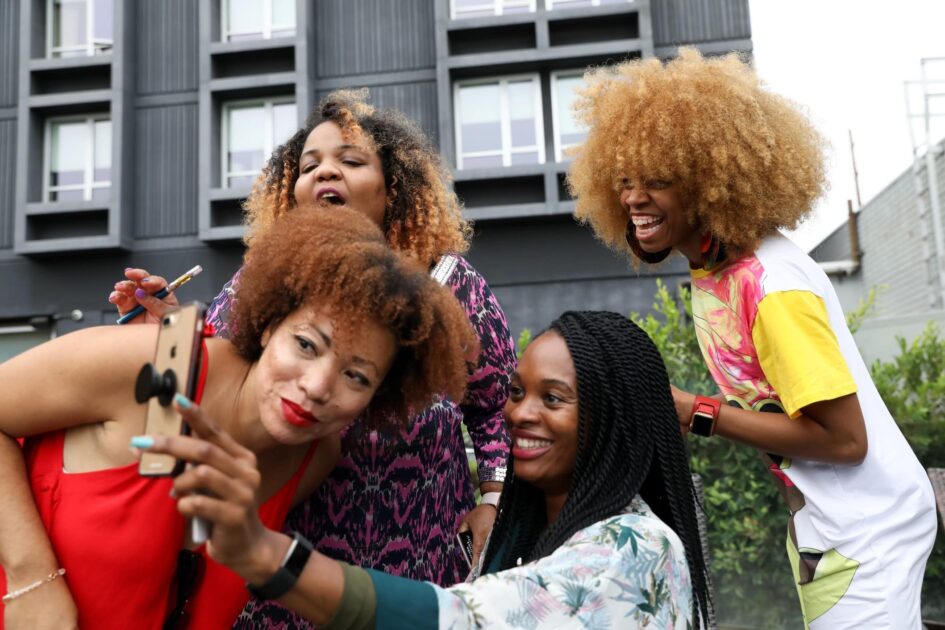Black Therapists Ireland: How to talk to your parents
Psychotherapist Ejiro Ogbevoen talks about speaking to your parents about mental health, sexuality and body image

SpunOut.ie Action Panel member Rebecca Adeyemo interviewed Psychotherapist and founder of Black Therapists Ireland Ejiro Ogbevoen about taking care of your mental health as a person from an ethnic minority background living in Ireland.
Speaking to your parents as a black young person about mental health
Rebecca: Do you have any advice for young people struggling to discuss their mental health with their parents?
Ejiro:
Yes, what I would say to young people struggling with their mental health and how to discuss it with their parents would be to first understand what is going on for them. If they’re struggling, they need to speak to somebody. And I want to say that maybe your parents may not be the best people to be talking to but you have to find a way to let them know what is going on with you.
Have at the back of your mind that every parent wants their child to be well in every aspect; physically and mentally. There is no one-size-fits-all here. If you feel your parents would not listen or accept that you are having a mental health problem then look for somebody in the family, extended family or the community that commands your parents’ respect. Such people could stand by you while you talk to your parents about your mental health or speak on your behalf. The most important thing is to talk to somebody.
It could be another adult or even your GP. If you feel your parents may not understand, they definitely would understand talking to your GP.
Lastly, if you have not done so and you think that the conversation needs to happen, then speak to your parents, but do it respectfully and in a way that they would understand. What’s the worst that could happen? Just don’t leave it because your parents are not responding the way you want them to. Support yourself to get your needs met.
Coping with pressure from parents as a young black person
Rebecca: What are some healthy ways of coping with pressure from family?
Ejiro:
When you have pressure from family that is quite vast, it could be pressure from family for so many reasons. It may have to do with school, it could be the way you are spending your time, it could be about anything. I think at this point, I’m going to focus on the pressure that comes from them affecting your mental health.
I know as an African parent we want so much for our kids. So much that we can want too much that they cannot handle. So being able to balance that is something we need to teach the adults, but at the moment, if you’re feeling too much pressure from your parents, you have to speak to somebody.
Again, the GP is a good way to go. An adult in your life that you can talk to is a good way to go. I know directly talking to your mother or your father may not be very easy, especially if they don’t want to know. They just want to see you do the work, it can be quite challenging. So I understand that and I know that I don’t want you to get sick before something happens. So if your parents aren’t listening. Look for somebody who will listen. That’s the most important thing.
Remind me again, what was the question?
Rebecca: Healthy ways of coping with pressures.
Ejiro:
It depends on your age. I think it’s important that you know that you’re still in charge of the things that need to be done. There are things that are expected of you but you are still in charge of what you can do. So take responsibility for that. If your school work is too much, then you know how to spread that out, how to make school work easier for yourself.
You know what works for you. A major coping skill is to first understand that there are certain things you are in charge of. So make that work for you. And don’t try too hard to meet everybody’s expectations of you because your family, teachers, friends and all others want stuff from you, and it can be too much. If you’re challenged, speak to somebody about your mental state.
Speaking to parents about being LGTBI+
Rebecca: Would you have any tips for young people struggling to discuss things like body image, sexual orientation or identity with their parents?
Ejiro
Yes. Those are really, really, important issues and if you’re struggling with it, you need to find a space to talk about it. Yesterday I was at a webinar and it was talking about being LGBTQI. The representation of the African community was limited, let’s put it that way. It’s not because there are no black people here, it’s because of the fear and the stigma. Black people not wanting to accept it to themselves, let alone saying it to somebody else.
First of all, I want to say that you are who you are. That’s the most important thing. If you can first accept that you don’t have to fight with yourself for who you are. That’s one huge battle. That you have to work on talking to somebody else who would understand would then be the next step.
But again, it is the same process. If you cannot talk to your parents about your sexual orientation because it is a cultural taboo, then involve somebody in the family, the extended family, the church, etc who understands or accepts you for who you are and can support you in getting your parents to see and accept who you are and not who they want you to be.
It is also ok to know your truth and not try to get anyone else to accept or not accept you. The only person who needs to accept you is you.
Speaking to parents about struggling with body image
We all have a vision of how our “perfect” selves should look like, even the models on the pages of magazines. So if you’re struggling with your body image you are not alone. The main thing is that if you can accept you for who you are, then the world will accept you. It’s not that you need them to accept you before you can accept yourself. Accept yourself first then the world will follow suit. Try to look for communities that are out there that would support you, and help you support yourself.
There are people out there that will give you the support you need. You can go online easily these days and look for people out there with your body type, body image or issues who are doing well, happy and successful. These people have their stories. Research them and you will find what makes these people tick and how they were able to accept themselves despite their issues.
And I know that we want to talk to our parents, but if our parents are not going to be supportive, maybe they should not be the first people we talk to. Having said that, there are a lot of parents who would give great advice.
Speaking to your parents about what you eat
Rebecca: How can a young person discuss not wanting to eat certain foods with their parents?
Ejiro
That can be a very challenging one, because I know that coming from an African background we show affection to our kids by the food that we prepare for them and we want them to eat everything that we make. And if the child says, I don’t want to eat it, it can feel like you are slighting me or disrespecting me or not wanting to do what I know is best for you.
So it’s a tricky one, but I think we can overcome it, by finding the right time and the right space to talk to your parents. When your parent is in there best mood, bring it up. Help them understand what you’re trying to achieve.
If, for example, you’re trying to lose weight or you’re trying to build your muscles or, you know, something just doesn’t sit well with you, saying “No, I’m not going to eat it!” is just going to make things worse. It’s going to aggravate things and I know that while that’s how you feel, let’s try to get our parents on our side.
Look for a great time that your parent is in the best space, their best mood. Make them a sandwich, make them a cup of tea and bring up the issue. Tell them how it makes you feel or how you’re trying to lose one kg in the next while and it will support you if you don’t eat the soup. I bet you they would support you because your parents want the best for you.
And if they don’t understand what you’re trying to do, then their actions might feel like they’re going against you. So help them understand what you’re trying to do and they will support you.
Read more of our articles by Black Therapists Ireland:
Mental health supports you might be interested in:






